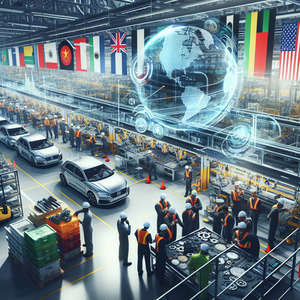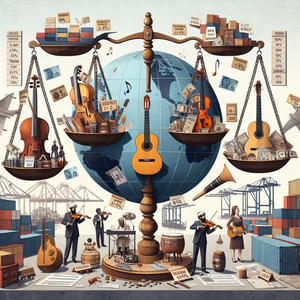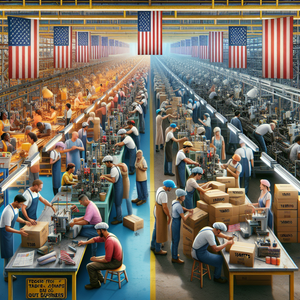
Navigating Tariffs in the U.S. Auto Industry: Challenges, Opportunities, and Key Career Roles
The U.S. automotive industry is navigating a period of profound change. Tariffs on imported vehicles and parts, implemented to encourage domestic manufacturing, are creating ripple effects across the sector. While these trade measures aim to bolster American production, they come with unintended consequences, including increased costs, supply chain disruptions, and operational challenges. The industry, already grappling with technological advancements and global competition, now faces an added layer of complexity.
Job Summaries:
Manufacturing Engineer:
- As automakers bring production back to the U.S., manufacturing engineers are instrumental in designing efficient processes to offset higher costs.
- These professionals streamline operations, minimize waste, and maintain quality standards.
- For example, companies like Ford and GM have relied on engineers to retrofit existing plants for new production lines.
- A degree in mechanical or industrial engineering, paired with lean manufacturing expertise, is essential.
Supply Chain Analyst:
- Tariff-induced disruptions demand innovative solutions from supply chain analysts.
- These professionals evaluate sourcing strategies, mitigate delays, and identify cost-saving opportunities.
- For instance, analysts at Stellantis recently restructured their supply chain to adapt to rising import costs.
- Proficiency in tools like SAP and Tableau is critical, along with strong problem-solving skills.
Customs Compliance Specialist:
- With evolving trade laws, customs compliance specialists play a vital role in ensuring imported parts meet regulatory requirements.
- They manage documentation, classify goods, and avoid costly penalties.
- A Licensed Customs Broker certification is highly valued in this field, which has grown significantly in demand as automakers contend with tariff complexities.
Logistics Coordinator:
- Logistics coordinators ensure vehicles and components are delivered efficiently despite supply chain disruptions.
- During the early months of the U.S.-China trade dispute, logistics teams had to navigate port delays and reroute shipments.
- Strong skills in route optimization, negotiation, and logistics software are essential.
Quality Control Inspector:
- As reshoring introduces new suppliers and materials into the supply chain, quality control inspectors ensure products meet stringent safety and performance standards.
- Certifications like Six Sigma and ISO 9001 are valuable, particularly as consumers demand reliability in a competitive market.
Tariff Policy Analyst:
- These analysts evaluate trade policies and provide actionable insights for navigating the tariff landscape.
- They assess economic impacts, recommend mitigation strategies, and inform decision-making at executive levels.
- A strong foundation in economics and international trade, coupled with political acumen, is critical.
Production Supervisor:
- Production supervisors manage factory teams, ensuring operations run smoothly amid tariff-related pressures.
- Leadership skills and expertise in operations management are vital, especially when overseeing new production lines or restructured shifts.
Sourcing Manager:
- In response to tariffs, sourcing managers renegotiate contracts, explore alternative suppliers, and secure cost-effective materials.
- For example, Tesla’s sourcing team adapted by increasing its reliance on domestic suppliers.
- A background in procurement and strong negotiation skills are essential.
Automotive Sales Manager:
- Tariffs have driven up vehicle prices, forcing sales managers to develop creative strategies to maintain revenue.
- Effective market analysis, customer engagement, and pricing strategies are critical.
- For instance, dealerships have leaned on promotional campaigns to offset higher sticker prices.
Industrial Automation Specialist:
- To combat rising labor costs from reshoring, manufacturers are investing in automation.
- Specialists in robotics and programming design systems that improve efficiency.
- Expertise in tools like CAD software and PLC programming is crucial, as automation becomes a cornerstone of domestic production.
Environmental Compliance Manager:
- As companies expand domestic operations, meeting U.S. environmental standards becomes a priority.
- Compliance managers oversee sustainability initiatives, ensure adherence to EPA regulations, and improve eco-friendly practices.
Aftermarket Parts Specialist:
- Tariff-related supply shortages have increased reliance on aftermarket parts.
- Specialists in this field manage inventory, source components, and assist customers.
- Strong technical knowledge and customer service skills are essential.
Economic Impact Researcher:
- Researchers analyze the broader implications of tariffs, such as job losses, price increases, and shifts in consumer behavior.
- These insights guide policymakers and executives.
- A strong background in data analysis and economics is required.
Plant Operations Manager:
- Overseeing daily operations in manufacturing facilities
- Ensuring production targets are met despite challenges
- Leadership skills and expertise in industrial management are key to navigating this role
Automotive Industry Consultant:
- Consultants offer strategic advice on navigating tariff-related hurdles.
- They assist with supply chain optimization, market expansion, and cost reduction.
- A background in economics or business is essential.
Trade Strategy Advisor:
- These advisors shape long-term strategies to mitigate tariff impacts.
- They analyze trade conditions, negotiate with suppliers, and recommend market entry or exit decisions.
Global Logistics Analyst:
- Global logistics analysts focus on optimizing transportation networks to minimize delays and costs.
- Their data-driven strategies are crucial for maintaining efficiency in a tariff-heavy trade environment.
Cost Estimator:
- Cost estimators evaluate the financial impact of tariffs and recommend cost-saving measures.
- A background in finance or supply chain management is critical.
Vehicle Pricing Analyst:
- Pricing analysts create models to balance profitability with market competitiveness.
- Predictive analytics and data science expertise are essential, particularly as tariffs drive up production costs.
Policy Advocate:
- Policy advocates lobby for favorable trade terms.
- Policy advocates communicate industry concerns to policymakers.
- Their work helps shape the regulatory environment of the auto sector.
The U.S. auto industry is at a crossroads, grappling with both the challenges and opportunities presented by tariffs. While the increased costs and supply chain disruptions pose significant hurdles, the industry is also fostering innovation and creating new career paths. From engineers designing automated systems to analysts reshaping supply chains, the roles highlighted here are critical to the sector’s resilience and evolution. For job seekers, this moment presents an opportunity to upskill, adapt, and align with industry demands. Whether you're an experienced professional or entering the automotive workforce, developing expertise in areas like logistics, compliance, and engineering can position you for success in this dynamic field. As the industry continues to evolve, those who embrace change and innovation will thrive.
Explore More Jobs

